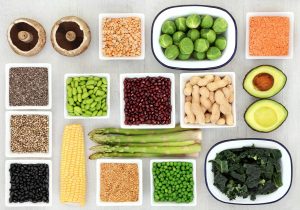
Understanding fiber and its benefits
People praise the power of protein, they go all in on fat, or gush over going vegan, but fiber typically doesn’t get the same kind of attention. Perhaps that’s because any mention of dietary fiber seems to make some people a little uncomfortable. Why? Well, there’s often the question, does dietary fiber make you go? Before getting to the sensitive subject of does fiber make you go, it’s best to understand what is dietary fiber and why it’s the unsung hero of health. So, take a healthy look at what is dietary fiber, why is fiber important, and the foods highest in fiber to understand why fiber deserves your full attention.
The full story on what is dietary fiber
You may have been told to eat more fiber or seen the phrase “high fiber” on foods at the grocery store, but what is dietary fiber and why is fiber important? It’s a plant-based carbohydrate found in fruits, veggies, whole grains, legumes, and seeds. Your body can’t break it down or digest it, so fiber passes right through your digestive system and out of your body. If your body can’t break it down or digest it, why is fiber important? Because fiber does a lot of work and a lot of good on its way out.
Fiber in all its forms
While all fiber is good for you, not all fiber is good for the same things. There are two types of fiber known as soluble and insoluble based on the way they respond to water. Let’s break down the difference:
- Soluble fiber – This kind of fiber dissolves in water to form a gel-like substance in your stomach that helps slow down digestion to help you feel full, while also helping control your blood sugar, lower your cholesterol, and boost your “good” gut bacteria.
- Insoluble fiber – This type doesn’t dissolve in water, but it does bulk up your stool and help everything pass through your system to help relieve constipation.
Benefits of filling up on fiber
Why is fiber important? Fiber is probably best known for preventing constipation and helping you stay “regular.” No wonder the first thought at the first talk of fiber is, “Does fiber make you go?” It does, but fiber goes a whole lot further by providing a full range of health benefits. Let’s take a look at why fiber is important:
- Helps you lose or maintain a healthy weight – Fiber helps you feel fuller faster and stay satisfied longer, so you eat less and stay more in control of your appetite.
- Keeps your heart healthy – According to studies published in the BMJ, increasing your intake of fiber has been shown to reduce your risk of heart disease.
- Lowers cholesterol levels – As fiber passes through your digestive system, it grabs the LDL “bad” cholesterol and prevents it from being absorbed by your blood stream, which reduces your LDL cholesterol.
- Stabilizes blood sugar – Fiber helps prevent blood sugar spikes by slowing down your digestion.
- Good for your gut – Fiber feeds the “good” bacteria in your gut, which helps control the inflammation that causes so many health concerns.
- Regulates your digestion – It does this by bulking up your stool.
Are you getting your fill of fiber?
Most people ask, “How much fiber should I eat daily?” Unfortunately, most people don’t get enough fiber in their daily diet. According to the CDC, the Dietary Guidelines for Americans, 2020–2025 recommends that adults eat 22 to 34 grams of fiber daily. However, these fiber figures depend on your age, health, sex, and other personal factors. Ask your SignatureMD-affiliated doctor about how much fiber you should eat daily in order to fill your fiber needs.
Foods full of filling fiber
Plant foods like vegetables, fruits, whole grains, legumes, and seeds are typically the foods highest in fiber. While it’s hard to get too much fiber from food, increasing your intake too much and too fast can be too tough for your stomach to take. Instead, consider adding high-fiber foods to your diet slowly and be sure to drink plenty of water. If you’re trying to up your intake, chew over these foods highest in fiber:
- Navy beans
- Artichoke hearts
- Raspberries
- Flaxseeds
- Chia seeds
- Split peas
- Lentils
- Green peas
- Barley
- Bran flakes
- Butternut squash
- Potatoes
- Broccoli
- Brussels sprouts
- Prunes
- Pears
- Apples
- Bananas
- Oats
While it may not be as popular as protein or have as many fans as fats, it’s time to talk about fiber and show fiber some love because it shows your body so much.
Sources:
- https://www.cdc.gov/diabetes/healthy-eating/fiber-helps-diabetes.html?CDC_AAref_Val=https://www.cdc.gov/diabetes/library/features/role-of-fiber.html
- https://www.healthline.com/nutrition/why-is-fiber-good-for-you
- https://www.eatingwell.com/article/287742/10-amazing-health-benefits-of-eating-more-fiber/
About SignatureMD
SignatureMD is one of the nation’s largest firms providing initial conversion and ongoing support services to concierge medicine physicians. SignatureMD currently partners with over 200 affiliated primary care physicians and specialists across 35 states, and its network is rapidly expanding.